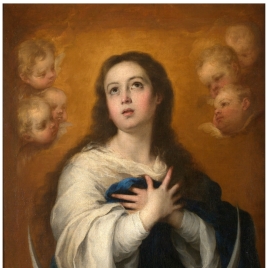The Hail Mary is Biblical
Father Angel Espinosa de los Monteros

Today, I would like to answer a question that I was recently asked about the Hail Mary prayer. It seems that the person who asked me was in contact with some non-Catholic person, whether Christian, Lutheran, Anglican, Calvinist, of any denomination, or even from groups like Jehovah’s Witnesses or Mormons. They said to him: “Why do you pray the Hail Mary if the Hail Mary is not biblical, it is not in the Bible?”
How outrageous! How is it possible to say such a thing? If you read, and I have the Gospel in front of me, the Gospel of Saint Luke, in chapter 1, verse 28, it says: “Hail Mary, full of grace, the Lord is with you. Blessed are you among women, and blessed is the fruit of your womb, Jesus.” The rest is a petition that we make: “Holy Mary, mother of God, pray for us sinners, now and at the hour of our death. Amen.” This second part is obviously not in the Bible, but when we say “mother of God,” that is. Let’s look at the first part, which is the biblical part.
In Saint Luke 1:28, the angel came to her and said: “Hail, full of grace, the Lord is with you.” That’s the first part of the Hail Mary. Let’s remember that it was first written in Aramaic, then in Greek, then in Latin, and then in many other languages. In Greek, it says “Hail Mary,” which can be translated as “Rejoice, Mary” or “Hello, Mary.” In Latin, they put “Hail Mary,” and in Spanish, the translation that was given was “God save you,” following the Latin. It has nothing to do with “I hope that God one day saves you.” We are talking about God greeting you, that God is with you. So why say that the Hail Mary is not biblical?
In verse 1:28, chapter 1 of St. Luke, it says: “Hail, full of grace.” In Greek, we say “Kejaritomene,” which means “full of grace.” The Lord is with you. And where does the “blessed are you among women” come from? In verse 1:42, Mary went to see her cousin Elizabeth, and she was filled with the Holy Spirit and cried out with a loud voice: “Blessed are you among women, and blessed is the fruit of your womb.” The most important part of the Hail Mary is in the Bible, that is, it is in the Gospel. Elizabeth, filled with the Holy Spirit, and the angel who came and announced to Mary on behalf of God. So how is it possible to deny that the Hail Mary is biblical?
The second part is a request of ours: “Holy Mary, mother of God, pray for us sinners, now and at the hour of our death.” But where did the “mother of God” come from? In Luke 1:35, it says: “The Holy Spirit will come upon you, and the power of the Most High will overshadow you; therefore the child to be conceived will be holy and will be called the Son of God.” Therefore, you are the mother of God. Here some people are asking: “What heresy? God has no mother, because if God has a mother, it means that there is a person greater than God himself.” We are talking about the Holy Trinity, right? God the Father has no one above Him. God the Son, incarnated, wanted to come into the world through a woman, Mary. Mary is the mother of Jesus, and Jesus is God. When we say “mother of God,” we are not talking about the mother of the Holy Trinity, but about the incarnation of the Son of God.
The Hail Mary is completely biblical and evangelical. In Latin, it is said “Salve,” and in Spanish, “God save you.” How beautiful to see that this prayer has its foundation in the Bible, like the Lord’s Prayer in the Gospel, coming from the very mouth of Jesus. Our Catholic prayers are completely biblical and evangelical. Understand it and, most importantly, pray it from now on with all your heart.
A fraternal recommendation: pray the Rosary every day. 800 years ago, with Saint Dominic de Guzman, this precious devotion began. To pray the Rosary is to contemplate the life of Christ. What are the mysteries: the Incarnation, the Visitation, the Birth of Christ, the Presentation at the Temple, the Child lost and found in the Temple, the luminous mysteries, the Baptism of Jesus, the Wedding at Cana, the sending of the disciples, the Transfiguration, the Eucharist, the sorrowful mysteries, Gethsemane, the Flagellation, the Crowning of Thorns, the Way of the Cross, the Passion and death of Jesus, and the glorious mysteries, the Resurrection, the Ascension, the Descent of the Holy Spirit, the Assumption of the Blessed Virgin and the Coronation of Mary.
To pray the Rosary is to contemplate the life of Christ with the eyes of Mary. And remember that the Hail Mary is completely biblical and evangelical. Let us do all the good we can, let us pray the Rosary every day. May God always bless you.
Subscribe for more content and follow me on all my social networks. Let us do all the good we can. God bless you always.
Related

Miserando atque eligendo: The Legacy of Mercy in the Church
Luis Herrera Campo
28 April, 2025
3 min

A Meeting of Hope in St. Peter’s Basilica: Trump and Zelensky
Exaudi Staff
27 April, 2025
2 min

Saying Goodbye to Francis
Exaudi Staff
26 April, 2025
2 min

The Family: A School of Love, Forgiveness, and Hope
Laetare
25 April, 2025
3 min
 (EN)
(EN)
 (ES)
(ES)
 (IT)
(IT)

